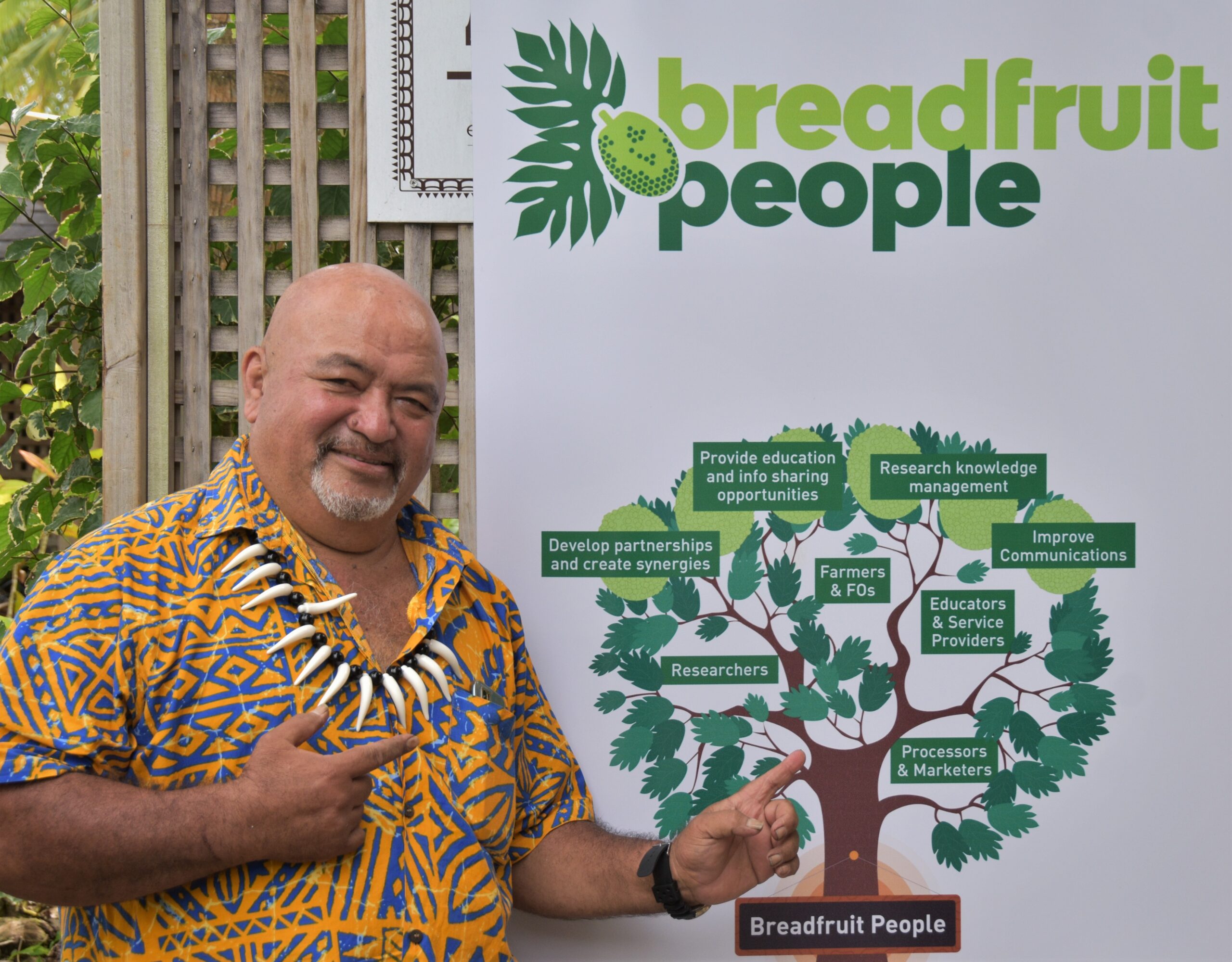Farmers divided over domestic consumption, export potentials
Tuesday 26 March 2024 | Written by Melina Etches | Published in Environment, Local, National

Rarotonga farmer Danny Mataroa supports the revival and promotion of breadfruit production in the nation. MELINA ETCHES/ 23082304
Former Agriculture minister, Kiriau Turepu, sparked debate recently by suggesting that exporting produce should not be a priority for Cook Islands growers.
His comments were met with criticism from Te Tango Enua growers’ association president, Danny Mataroa, who believes export should always be an option for excess produce.
Turepu, a seasoned farmer, pointed out the establishment of several groups aiming to market export produce and questioned the relevance of certain farming workshops, like the one on kuru (breadfruit) flour production.
“Like the kuru workshop last year, we don’t have the land to plant kuru to produce flour… it’s just sad you know how people don’t think,” said Turepu, who served as the country’s Agriculture minister from 2013 to 2018.
“And look at the nono industry all those trees that were planted, what a waste.”
Turepu argued that taro exports, initiated in Aitutaki (2021) and Rarotonga (2022), were unrealistic due to limited land availability.
He emphasised that local growers should focus on fulfilling domestic needs.
“Export is never an option for us, don’t think about it,” Turepu suggested.
“The focus should be to serve our own local population first, to supply them, look after ourselves and cater to the increasing tourism industry.
“The demand is here to fulfil the needs of the people on the ground first. We shouldn’t be struggling to provide food for us.”
Mataroa disagreed, stating that exporting surplus produce should be an option for local farmers.
He questioned Turepu’s discouragement of pawpaw exports during his ministerial term.
“When he was the minister, he discouraged the export of pawpaw, why should I listen to what he says or thinks now,” Mataroa said.
“Everyone is entitled to their opinion and he has got his own. There are educated opinions and there are tested opinions and we should always consider what’s good for us farmers and the country.”
Mataroa says the availability of land is not an issue. “It’s our people, our own children who don’t want to farm,” he said. “And it’s to do with the education system too, agriculture is now lost (in the school curriculum).”
“The budget for agriculture is one of the lowest, how can you expect agriculture to come in front and lead when we are not willing to invest in it.”
Last year, Mataroa submitted to the Public Accounts Committee (PAC) on the 2023-24 Budget, asking for the Agriculture Ministry’s Budget to be increased to about $10 million over two years. Agriculture currently gets between $1.3m to $2m per year in the Budget.
Regarding the kuru workshop, Mataroa, a proponent of breadfruit flour and export, clarified that while breadfruit isn’t currently an export product, it holds future potential.
“Food security is the main issue here. There is political unrest going on all around the world, are we just going to sit down and not prepare ourselves,” he questioned.
“All it takes is a threat for war, not even an actual war, and the containers will stop coming. What are we going to do then?
“Breadfruit will first of all take care of the food security issue so we can have flour from the breadfruit if ships stop coming. We can make chips. The French fries import is a $3 million market here, we can reduce that by promoting island fries.”
Mataroa proposed a long-term plan to plant 20,000 breadfruit trees by 2030, with one tree per household.
“It’s a long-term target. We have to look further than the band-aid solutions. There’s a need for a major surgery in the agriculture sector and it has to start now. People are just interested in taking consultation fees for making plans but they don’t want to implement them,” he said.
“When you’re able to achieve these long-term targets then you have a produce that’s in excess and then what you are going to do with it. You will have to export them.”
Both Turepu and Mataroa concurred on the need to address the fertiliser shortage faced by Rarotonga and Pa Enua farmers.
The Ministry of Agriculture reportedly used to have a fertiliser revolving fund with the Ministry of Finance and Economic Management, but it was closed in July 2023.
The newspaper approached Agriculture for comments on the shortages, amid reports that the ministry lacks the funds to purchase another container.
Turepu told Cook Islands News last week: “We need an extra container of fertilisers and chemicals, there is nothing on the island.”
“Aitutaki is struggling and Mangaia is crying for fertiliser, this is the reality today.”
Mataroa said Turepu never addressed the fertiliser issue when he was the minister, questioning “how can he solve it now”. Turepu had said he was taking matters into his own hands by planning to import a container of fertiliser and chemicals.
- Rashneel Kumar/Melina Etches















































